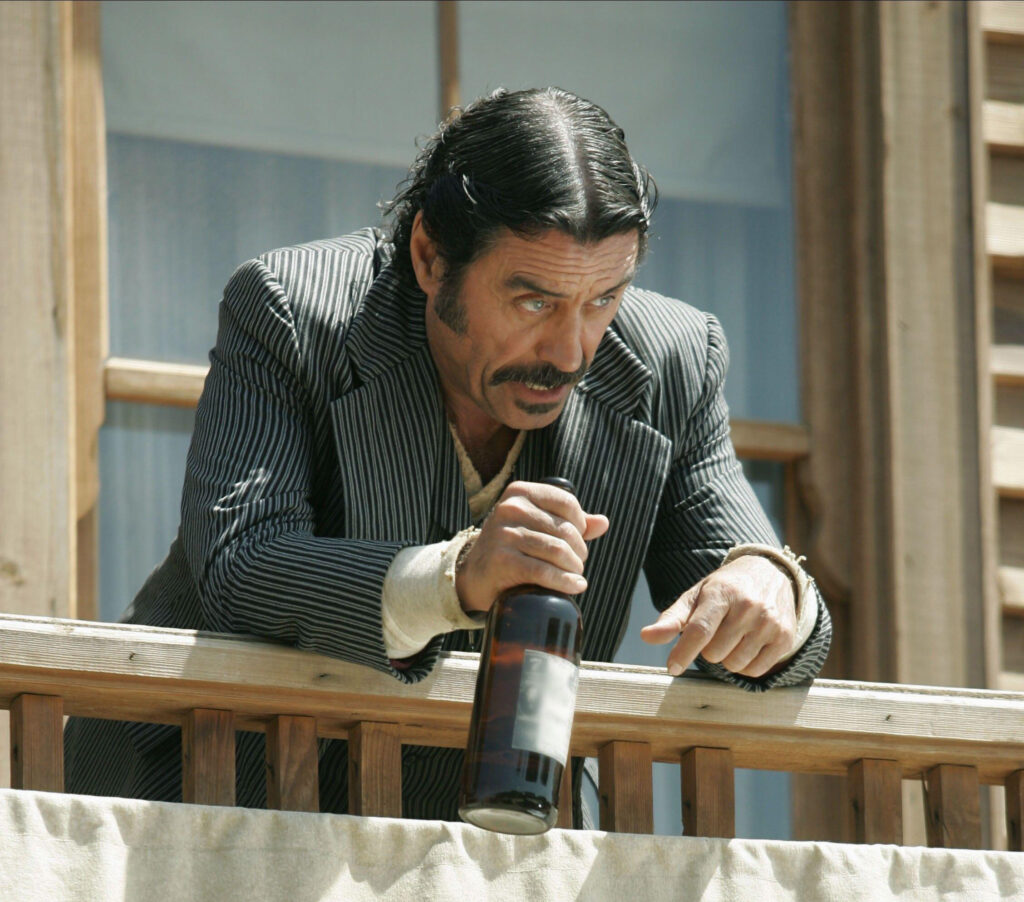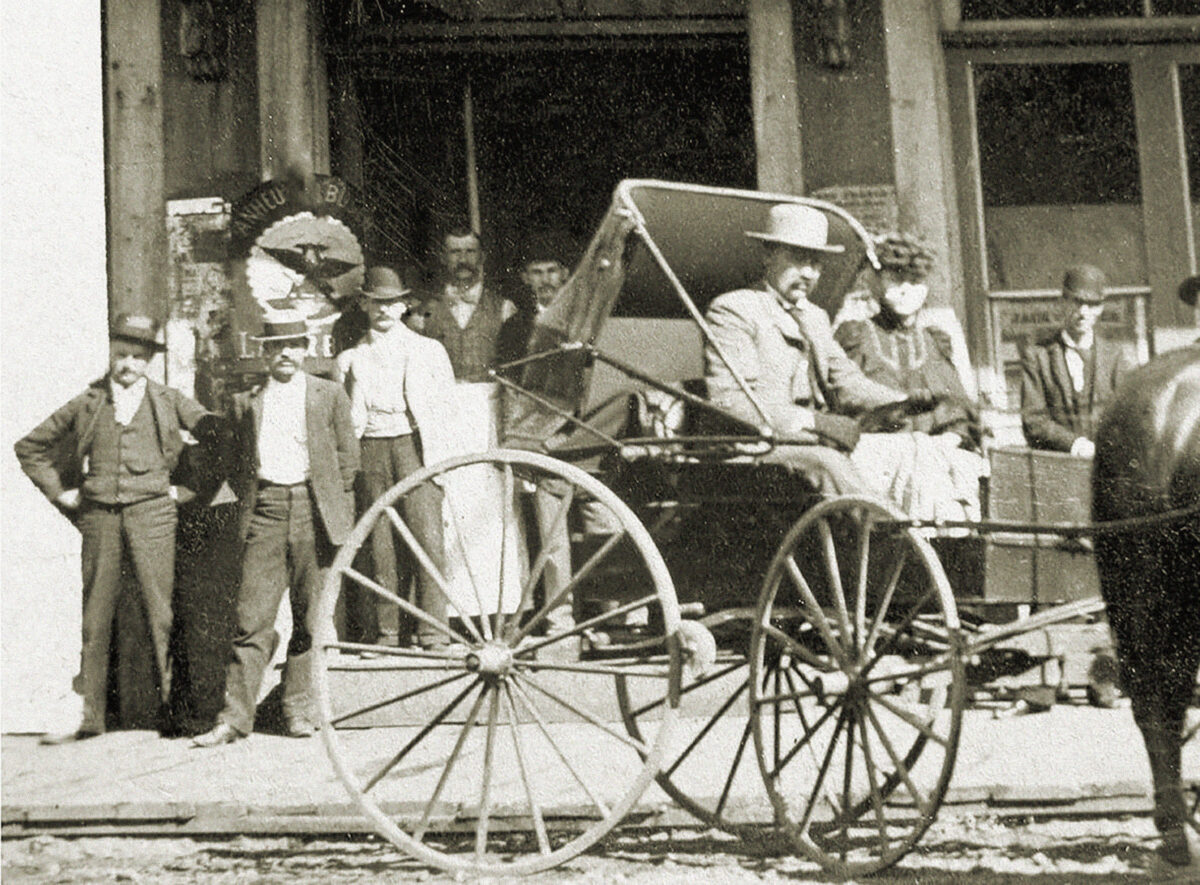The historical record contains a wealth of primary sources from the early days of Deadwood, Dakota Territory. Images and paperwork of all stripes are extant both online and in physical archives. Lacking have been fuller profiles of the town’s various and sundry characters, divorced from the legends that many worked to craft for themselves. One such character of note is Ellis Albert “Al” Swearingen, who is most closely associated with Deadwood but met his demise in Denver on Nov. 15, 1904.
Al and twin brother Lemuel Swearingen were born in Oskaloosa, Iowa, on July 8, 1845. Their parents, Daniel and Keziah Swearingen, were farmers who would eventually establish a prosperous walnut grove near Yankton, S.D. By the spring of 1876 Al had moved to the gold boomtown of Deadwood, where he soon started the Gem saloon. Completed the following year, the Gem served as a bar, variety theater, brothel and the headquarters of Swearingen’s own corrupt fiefdom that for several years ruled over many aspects of underlife in the burgeoning community. In 1887 Nebraska’s Omaha Daily Bee reported that Swearingen had forcibly detained without pay at the Gem two married stage performers from Omaha, prompting their husbands to petition Deadwood Mayor Sol Star for their release. According to one of Al’s contemporaries, chronicler John S. McClintock, the profits the Gem brought effectively blinded Deadwood’s most prominent citizens to Swearingen’s boundless corruption. Death eventually tracked him down in Denver. Newspaper accounts suggest he fell off a streetcar or train while trundling about the Colorado capital, though the weight of evidence points to a darker demise.
Certainly, Swearingen was reviled by many who would have wanted him dead, not least the women who found themselves in his orbit. Driven by a lust for power and wealth, he had no compassion, even when it came to romantic partners. In 1889, for example, a Deadwood judge issued a warrant for Swearingen’s arrest after he’d brutally beaten his second wife and threatened to cut her throat with a straight razor. He avoided justice that time by skipping town for Omaha. It wasn’t an unprecedented assault. In 1879 Swearingen had been arrested, fined $50 and put under a $500 bond after having badly beaten first wife Nettie, the Black Hills Weekly Pioneer reporting that her face had been “pounded almost to a jelly.” The Oct. 25, 1884, edition of the Carbonate Chronicle, in Leadville, Colo., recounted Nellie’s life of abuse at her by then ex-husband’s hands. “He was jealous of the girl’s pretty face,” the paper alleged, “accused her of infidelity when there was no proof of it and beat her without cause.”
While most women of the period had few options beyond motherhood and prostitution, Nettie had found success in the early 1870s as a member of a troupe of variety players. Unfortunately, in 1875 a gunman named Edward Frodsham shot Nettie’s husband, Charles Peasley, to death in front of her at a Wyoming Territory bar. Within months she met and married Swearingen, then working as a bartender at a joint in Laramie. After a stint operating a dance hall in Custer City, Dakota Territory, he and Nettie ended up in the frontier morass known as Deadwood. Meanwhile, the beatings continued.
In 1880 she escaped, far worse for the wear, and landed in Leadville, another boomtown with a deficit of humanity. An article in the Carbonate Chronicle stated she became a “ward” of one Albert Marshman, though what that relationship entailed it didn’t specify. Another article in the same edition reported Nettie was afflicted by dropsy, a buildup of fluid in the body since associated with ailments such as liver disease. By October 1884 Swearingen’s 30-year-old abused ex was dead by way of whiskey and morphine.

Swearingen appears to have left Deadwood soon after the Gem burned down in 1899. According to the Denver Post, he spent several years prospecting around Leadville and taking odd agricultural jobs in the potato fields before pushing on to Denver. Mortuary owner William P. Horan was the latter city’s official coroner from 1900 to ’18 and would have been on hand that fateful day in mid-November 1904 when Swearingen’s body was brought in. Turn-of-the-century coroner’s reports are awash in drug overdoses, liver disease, violence and suicide, and the last record of Swearingen was no less dark.
Acquaintances in Denver had known him as “Albert Ellis,” an alias he likely adopted as cover from past associates looking to do him harm. The month before Al’s death twin brother Lemuel, a successful butcher and former councilman back in hometown Oskaloosa, Iowa, was shot five times, it was thought in a case of mistaken identity. Lemuel survived, but Al ran out of luck.
According to the coroner’s inquest, the body was found at the Denver & Rio Grande railroad crossing on Alameda Boulevard. His crushed legs, broken ribs and fractured skull were consistent with a fall from a train, though the injuries also seem consistent with having been beaten to death. At the time no one directly suggested foul play, but a Rocky Mountain News article from October 17, a month before Swearingen’s death, reported he was to testify against former friend John Allison for having stolen $45 from Al after the pair worked the potato fields together in Eden, Colo.
The circumstances of Swearingen’s death may never come to light. What is certain, however, is that he did not die abed in Deadwood as the HBO series of that name portrayed. The day after his death the Denver Post had the last word in an article headlined Old Prospector Is Killed by a Train. It painted a rather pathetic picture. Swearingen had recently been released from county jail for vagrancy. His meager belongings amounted to a cheap watch and, bizarrely, some dynamite and blasting caps. Also found on his body was an unsent letter addressed to an R.T. Wilson, asking to be brought tobacco in jail. Authorities turned over his loose items to Wilson, while his remains eventually found their way home to his family in Oskaloosa for burial.
It’s hard to convey how close to the bone life was for Westerners who found themselves on the wrong end of the booms and busts. Equally difficult is separating legend from reality with regard to the characters who made the West wild. Characters like Swearingen and the women who fell under his sway are a good reminder that much of the savagery on the frontier was omitted from the first drafts of history.






